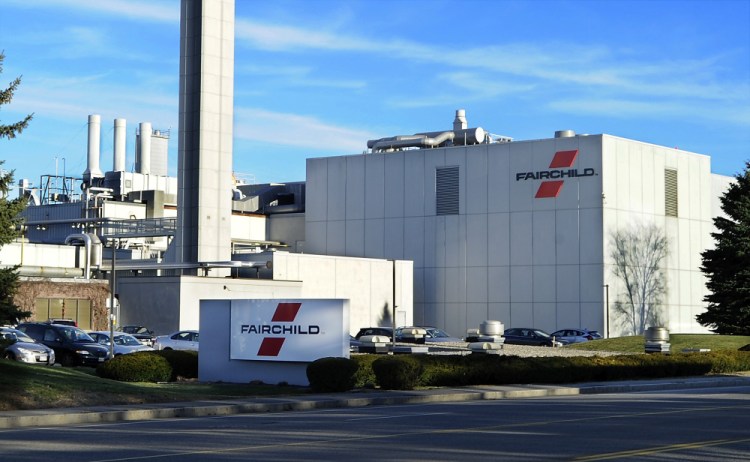Fairchild Semiconductor, which has about 650 employees in Maine, is being sold to an Arizona company for $2.4 billion.
ON Semiconductor of Phoenix, a Fairchild competitor, is buying the chip maker using mostly borrowed funds.
Neither company indicated Wednesday whether the sale would result in layoffs.
The combined companies will overlap in some product areas. Both make chips that control power supplies, but Keith Jackson, ON Semiconductors’ president and chief executive officer, said in a conference call Wednesday that the overlap was “minimal” and the product lines would complement each other.
“Even though the two companies have complementary product portfolios, they serve similar end markets and a similar set of customers in similar geographies,” Jackson said. “There is a lot of commonality between the manufacturing and logistics operations of the two companies.”
But an industry analyst said he doesn’t think Fairchild brings a lot to the transaction.
The chip fabricating plant in South Portland is older than most of those owned by ON Semiconductor, said Stephan Ohr, a semiconductor analyst for Gartner, a high-tech research and advisory firm. If the chip market continues to contract, he said, company officials would be more likely to close an older plant.
“There is not a lot that Fairchild can offer right now,” Ohr said.
He also said that Fairchild is not seen as much of an innovator in the market, further complicating the positions of its products and people in the combined company.
The deal is expected to close in the second quarter of 2016. For the third quarter this year, Fairchild reported a net loss of $8.2 million and sales of $342.1 million, down 10 percent from the same period in 2014.
CONSOLIDATIONS AND EFFICIENCIES
Fairchild workers mostly declined to comment on news of the transaction, although one noted that such deals are common in the industry this year.
“I don’t know what’s happening, but it’s happening everywhere,” said Abdi Ahmed, an equipment technician at the South Portland plant.
Fairchild, which was headquartered in South Portland until 2011 when it moved to San Jose, California, makes semiconductors that control the power supplies in electronics, automobile chips and electronic signal converters. ON Semiconductor also makes power supply chips, along with semiconductors for mobile phones, lighting, medical and consumer applications.
ON Semiconductor said it expects to save about $150 million a year once the sale is completed. About $30 million will come from better coordination of supply chains, Bernard Gutmann, ON Semiconductor’s executive vice president and chief financial officer, said in the conference call.
He also said the combined company could save on general expenses, and that many of the two companies’ research and development functions will be redundant under single ownership.
Deals involving chip makers have become much more frequent this year because the costs for designing chips are rising and sales are slowing. Buying companies that already make chips and have a piece of the market, instead of investing in new designs and building new plants, is seen as the preferred way for a company to expand its market.
In 2011, ON Semiconductor acquired Sanyo Semiconductor for $600 million – the first time a Japanese semiconductor company was bought by a U.S. company. Last year, ON Semiconductor bought Aptina Imaging for $400 million and Tennessee Imaging Inc. for $92 million to expand its presence in the image sensor market.
Despite the relocation of its headquarters four years ago, Fairchild still has some corporate offices on Running Hill Road in South Portland, a short distance from its chip-making plant on Western Avenue. Between the two locations, Fairchild has about 650 employees in Maine.
NOTED CO-FOUNDER, GIVING EX-WIFE
The company’s impact in Maine goes beyond the jobs it has provided.
Robert Noyce, one of the inventors of the microchip, is a co-founder of Fairchild Semiconductor. After he and his then-wife, Elizabeth Noyce, divorced in 1975, Elizabeth Noyce moved into the couple’s summer home in Bremen. She was entitled to half of the couple’s assets under California’s community property laws, and because Robert Noyce had gone on to co-found the computer industry giant Intel in the late 1960s, she wound up with stock worth hundreds of millions of dollars.
Elizabeth Noyce gave millions to Maine charities and practiced “economic philanthropy,” founding Maine Bank & Trust and buying 10 percent of Portland’s downtown office space. She revitalized the properties and sold them, then moved on to other projects such as the Portland Public Market. She also used the proceeds to finance her charitable work. Before her death in 1996, Noyce established the Libra Foundation, which only makes grants to Maine organizations and had $133 million in assets as of the end of 2014.
Fairchild Semiconductor was purchased by National Semiconductor in 1987 and then sold to a group of National Semiconductor executives, led by Kirk Pond, in 1997.
Fairchild announced a month ago that it had hired Goldman Sachs to help it find a buyer. At the time, ON Semiconductor was identified as a likely purchaser. Infineon Technologies, a German chip maker, also was named as a potential buyer.
The all-cash deal values Fairchild at $20 a share. The stock closed Tuesday at $17.88 a share and shot up to $19.40 a share Wednesday.
ON Semiconductor stock fell nearly 8 percent Wednesday, closing at $9.89 a share. Investor concerns about the amount of debt the company will take on contributed to the drop.
Send questions/comments to the editors.




Comments are no longer available on this story